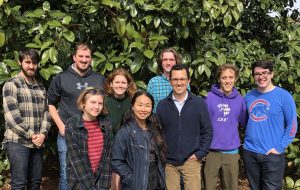Our lab received a new grant from NSF’s Frontier Research in Earth Sciences (FRES) Program, titled “From Peaks To Slopes To Communities, Tropical Glacierized Volcanoes As Sentinels of Global Change: Integrated Impacts On Water, Plants and Elemental Cycling.” The proposed work will take place on Cayambe and Antisana volcanoes in Ecuador.
Joseph Delesantro’s manuscript, titled “The Non-Point Sources and Transport of Baseflow Nitrogen Loading Across a Developed Rural-Urban Gradient,” has been accepted for publication in Water Resources Research
Congratulations to Kriddie Whitmore on her GSA Research Grant and Outstanding Mention for her doctoral research in the Andes Mountains of Ecuador.
Kriddie received a student research grant from the Society of Wetland Scientists, which will fund her upcoming field campaign in the Andes Mountains of Ecuador. Congratulations!
Diego has been selected to the inaugural group of recipients (3) of the Faculty Award for Global Excellence from the Office of the Vice Provost for Global Affairs.
Diego has been awarded a 2022-2023 Fulbright U.S. Scholar Award to Ecuador to investigate greenhouse gas emissions and hydrologic dynamics of streams of the Northern Andes.
IREU student Katie McMahon has been awarded a National Science Foundation Graduate Research Fellowship. Congratulations!
Kriddie Whitmore has been awarded the Community Engagement Fellowship from the Carolina Center for Public Service. Congratulations!
A new study led by three undergraduate students from the Carbonshed Lab (Schneider, Herrera, Raisle et al., 2020) was published in the Journal of Geophysical Research: Biogeosciences. See Publications for more details.
Professor Diego Riveros-Iregui has been named the Bowman & Gordon Gray Distinguished Professor of Geography. The Bowman and Gordon Gray Professorship is one of the UNC’s most esteemed awards for excellence in undergraduate teaching.
Our lab has received a grant from the National Science Foundation, titled “Conceptualizing and quantifying the function of beaver dams and stormwater ponds on the hydrology and biogeochemistry of urban streams.” This is a collaborative grant with Georgia State University (GSU), UNC-Charlotte (UNCC), and Georgia Gwinnett College (GGC).
Diego received the NSF CAREER Award to study “The role of small wetland connectivity in controlling greenhouse gas emissions and downstream carbon fluxes from headwater tropical streams.” The project will be conducted in the Ecuadorian Páramos
Diego received the 2019 J. Carlyle Sitterson Award for Teaching First-Year Students. The award ceremony will be during the halftime of the UNC-Syracuse basketball game on Feb. 26.

